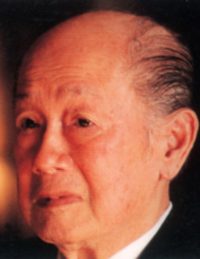Today was bad. They bombed the city.
I was in Wilson Building. I had a ringside seat. I saw the bombers —nine of them, in beautiful formation— shining in the sun. When they were over the building and could no longer be seen, the newsmen turned to the typewriter or the telephone. Then suddenly, three strong explosions. The building shook. I ran to the window and saw the bombs flower—as young Mussolini so prettily put it—in Port Area. They looked just like the newsreels of them. After a while, I saw two fires start.
They dropped bombs along a line running from Chicago and 13th Streets across Port Area to the vicinity of the Marsman building. The Myers building, the Manila Port Terminal bonded warehouse and the U.S. Army quarter master corps laundry were directly hit. About 150 people were either killed or wounded.
Shortly after the bombs fell, starting fires, the acrid smell of burning rubber and the sight of soldiers putting on their gasmasks spread the wild rumor of gas. This was the first real case of panic. The rumor circulated one night ago that the water had been poisoned had upset a few stomachs extremely susceptible to suggestion, nothing more. The rumor of gas, the fear of this new –to the city– form of death shattered the calm of those it reached, which the no less certain promise of death by bombs had failed to do.
One man dipped his handkerchief into the water in the gutter and covered his nose with what he hoped would be a fair substitute for the standard anti-gas. According to a newspaperman whose veracity in this case may be gravely held in doubt –it is such a good story– the man promptly fainted.
Had lunch and went back to the office. There I was told that we had the afternoon off. I had forgotten that the next day was Christmas. We always had the afternoon off the day before Christmas.
The man who told me the good news looked rather peaked and I asked him what was the matter. He had a brother, he told me, working in the bureau of printing, one of the places hit.
“He was standing with some men in the doorway when the first bomb fell. He went inside. The others remained where they were and the next bomb killed them. Had my brother stayed with them….”
Several alarms in the afternoon. The authorities are reported to be considering the proposition of declaring Manila an open city. Just because they bombed us once.
“Are we asking quarter of the enemy? Are we no longer sure of victory? What is a city?”
The people dream of guns and the opportunity of fighting the enemy if necessary in the streets. The people cannot understand this business of open city.
In the dusk a man in the uniform of a major of the United States Army walked into the yard and told us to put out a fire we had made under a mango tree. Earlier in the afternoon we had gathered the dead leaves in the yard and made of them a small bonfire. There was very little left of the blaze, only a bit of smoke still curling up from the ashy pile. Surely, not enough to constitute a violation of the blackout…
The previous night we had repeatedly called the attention of the man in uniform to a light that was showing through one of the windows of his house. Now, we thought, he was trying to be revenged on our “officiousness”. Because of his vesture of authority, we had no choice but to comply with his order. We saw him, as we stamped out the embers, walk stiffly out the yard.
That night a squad of soldiers, armed with rifles and a machinegun, surrounded the house of the man in a major’s uniform and we saw our visitor of the dusk walk out of the house and surrender quietly to the soldiers. He had been sending, we learned from one of the soldiers –they had to go through our yard to get to the man’s place– information to the enemy.
I tried to remember how he looked when he talked to us in the afternoon. In my mind I saw again the straight military bearing of the man, the close-cropped hair, the well-trimmed mustache, the hard grey eyes and inflexible lips, the neutral voice, the correct accent. I thought of the possible combination of circumstances that led him to take up such an occupation. I wondered if he had a wife and children, waiting for his return. I wondered what kind of a future he might have had if they had not caught him. I wondered, as they led him away, what kind of a man he was.
I suppose they shot him.
Forty Japanese transports were sighted today off the coast of Atimonan, Tayabas. Despite heavy losses, the enemy was able to effect a landing. Our troops were reported to be “behaving very well”. They were, as usual, outnumbered.
Several Japanese transports were also sighted off the coast of Batangas. No landing, however, was attempted.
USAFFE headquarters said nothing about the situation in Davao. It remained, to be precise, “obscure”.
